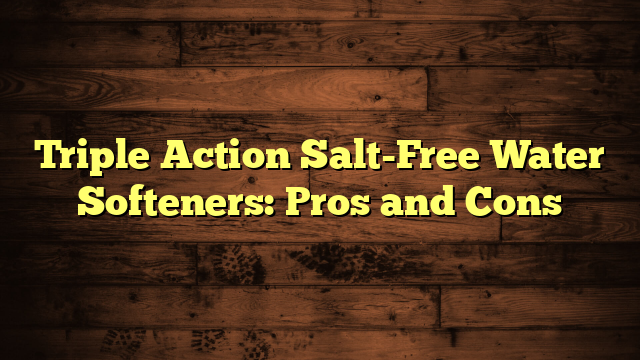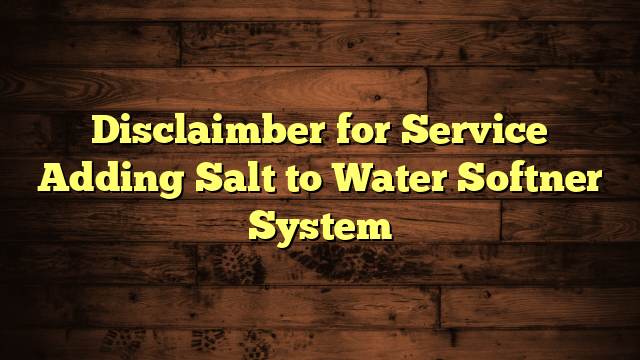Triple Action Salt-Free Water Softeners: Pros and Cons
Did you know that nearly 85% of households in the U.S. have hard water issues? If you're one of them, you might be considering a triple action salt-free water softener as a potential solution. These systems promise improved water quality and appliance longevity, but they also come with their share of drawbacks. Before you decide, it's essential to weigh the benefits against the limitations, especially regarding cost and maintenance. What factors should you prioritize when evaluating whether this system is right for you?
Key Takeaways
- Pros: Triple action systems effectively reduce scale, improve appliance performance, and enhance skin and hair quality without using salt or chemicals.
- Cons: They may not completely eliminate hard water issues, potentially leading to residual limescale buildup over time.
- Cost: Initial investment ranges from $300 to $1,500, with additional installation costs of $100 to $500.
- Maintenance: Regular maintenance and filter replacements are necessary to ensure optimal performance and prevent clogs or leaks.
- User Satisfaction: Most users report positive experiences, noting significant improvements in water quality and overall home comfort.
Overview of Salt-Free Softeners
Salt-free water softeners offer an innovative solution for tackling hard water issues without the use of traditional salt. These systems use various mechanisms, such as template-assisted crystallization, to alter the structure of minerals in the water.
Unlike conventional softeners that replace calcium and magnesium ions with sodium, salt-free alternatives prevent mineral buildup without adding anything to your water supply.
When you opt for a salt-free water softener, you're investing in improved water quality. This is particularly important for those concerned about health impacts from excessive sodium intake.
Furthermore, these systems are environmentally friendly, as they don't discharge brine into water systems, making them a sustainable choice for conscientious consumers.
You'll also find that salt-free softeners require less maintenance than traditional systems. There's no need for regular salt replenishment, which means fewer trips to the store and less hassle.
Advantages of Triple Action Systems
While many water softeners focus solely on mineral reduction, triple action systems offer a thorough approach that enhances water quality in multiple ways. These systems don't just soften your water; they also improve efficiency and provide additional benefits for your home.
By using a combination of filtration methods, triple action systems can remove more impurities, leading to cleaner, healthier water for drinking and bathing.
One significant advantage is that they often require less energy and fewer resources than traditional systems. This improved efficiency translates into lower utility bills and a reduced environmental impact.
Since these systems typically don't use salt or chemicals, they're also better for the environment. You'll be contributing to sustainability efforts by minimizing wastewater and avoiding the introduction of harmful substances into local ecosystems.
In addition, the enhanced filtration process can lead to longer-lasting appliances and plumbing, saving you money on repairs and replacements.
With triple action systems, you're not just investing in soft water; you're also making a smart choice for your home, your health, and the planet. Embracing such technology means enjoying the benefits of cleaner water while being environmentally conscious.
Disadvantages to Consider
When evaluating triple action salt-free water softeners, you'll want to weigh some disadvantages alongside their benefits. One key concern is that these systems may not fully eliminate hard water issues, which can lead to limescale buildup. Furthermore, some users have raised health concerns regarding the mineral content that remains after treatment.
Here's a quick overview of some disadvantages:
| Disadvantage | Description |
|---|---|
| Incomplete Softening | Doesn't remove all hardness, possibly leading to issues. |
| Health Concerns | Residual minerals may affect taste or cause reactions. |
| Environmental Impact | Production and disposal of materials can be harmful. |
| Cost | Higher initial investment compared to traditional systems. |
| Maintenance Needs | Requires regular maintenance for peak performance. |
You'll also want to take into account the environmental impact of these systems. While they avoid using salt, the materials involved may still have negative effects. To sum up, while triple action salt-free water softeners offer some advantages, it is crucial to evaluate these disadvantages carefully to make an informed decision.
How They Work
Triple action salt-free water softeners use innovative methods to tackle hard water issues without salt.
They primarily rely on the ion exchange process and magnetic water conditioning to prevent mineral buildup in your pipes and appliances.
Ion Exchange Process
The ion exchange process is a key mechanism behind how salt-free water softeners operate. This process helps remove hard water minerals, such as calcium and magnesium, which can cause scale build-up in pipes and appliances.
Here's how it works:
- Ion Exchange Resins: The system contains resin beads that attract and hold onto water minerals.
- Replacement Ions: As hard minerals bind to the resin, they're exchanged for softer minerals, typically sodium or potassium ions.
- Regeneration: Eventually, the resin needs to be refreshed, which is done using a regeneration solution that flushes out the accumulated hard minerals.
When water flows through the softener, the ion exchange takes place, effectively reducing the hardness of your water.
You'll notice improvements in your home, like softer skin after a shower and cleaner dishes.
This system doesn't use salt but instead relies on the natural exchange of ions to improve your water quality.
Magnetic Water Conditioning
Magnetic water conditioning offers an innovative approach to managing hard water without the use of salt. This technology utilizes magnetic fields to alter the physical properties of minerals found in hard water, such as calcium and magnesium. When water passes through these magnetic fields, the structure of the minerals changes, preventing them from forming scale deposits in your plumbing and appliances.
You might wonder how this process affects water quality. By changing the way minerals interact with each other, magnetic water conditioning can help keep your pipes clear and your appliances functioning efficiently.
While it doesn't remove minerals from the water like traditional softeners, it effectively reduces the negative effects associated with hard water.
Many users appreciate that magnetic conditioners are easy to install and require little maintenance. They don't consume electricity or require salt, making them a more environmentally friendly option.
However, it's important to note that results can vary based on water conditions and individual setups. While some homeowners report improved water quality, others may not notice significant changes.
As with any water treatment solution, it's vital to evaluate your specific needs and expectations before making a decision.
Cost Comparison
When considering a salt-free water softener, cost is an essential factor that can influence your decision. You'll want to evaluate both the initial investment and the potential long-term savings. Here are a few key points to think about:
- Initial Purchase Price: Salt-free water softeners typically range from $300 to $1,500, depending on the brand and features.
- Installation Costs: Some systems are DIY-friendly, while others may require professional installation, adding $100 to $500 to your overall cost.
- Maintenance Expenses: Salt-free systems generally require less maintenance than traditional softeners, which means lower ongoing costs over time.
While the initial investment might seem high, keep in mind that you'll save money on salt purchases, plumbing repairs, and appliance maintenance in the long run.
In addition, many manufacturers offer warranties that can further offset costs. By weighing the upfront price against these long-term savings, you can better determine if a salt-free water softener fits your budget and lifestyle.
Ultimately, making the right choice will guarantee you enjoy the benefits of soft water without breaking the bank.
User Experiences and Reviews
When considering a triple action salt-free water softener, it's essential to hear what other users have to say about its effectiveness in tackling hard water.
Many customers share their experiences regarding maintenance and how well these systems hold up over time.
Effectiveness in Hard Water
Many users have found that triple action salt-free water softeners effectively tackle hard water issues, transforming their daily routines. These systems target hard water effects and help reduce mineral buildup, making your home life more comfortable.
Here's what many users appreciate about their experience:
- Reduced Scale Buildup: Many users report a noticeable decrease in scale on faucets and appliances, which prolongs their lifespan.
- Smoother Skin and Hair: With less mineral content in the water, users often notice softer skin and shinier hair after showering.
- Enhanced Appliance Efficiency: Several reviews highlight improved performance in dishwashers and washing machines, leading to cleaner dishes and laundry.
Customers frequently express satisfaction with how these systems mitigate the hard water effects that can lead to frustrating clogs and spots.
The reduction of mineral buildup is a game-changer for many households, leading to less time spent scrubbing and more time enjoying the comforts of home.
While every experience varies, the overall consensus suggests that investing in a triple action salt-free water softener can greatly enhance your quality of life by addressing hard water challenges effectively.
Maintenance and Longevity Issues
Users often find that maintaining a triple action salt-free water softener can be straightforward, but certain longevity issues can arise. While many models require minimal upkeep, it's essential to keep an eye on maintenance frequency and potential longevity concerns. Regular checks can prevent bigger problems down the road, ensuring your system lasts longer.
Here's a quick overview of user experiences related to maintenance and longevity:
| User Experience | Issue Encountered | Solution Found |
|---|---|---|
| User A | Frequent filter replacements | Opted for a higher-quality filter |
| User B | System clogging | Regular cleaning solved the issue |
| User C | Reduced efficiency over time | System recalibration needed |
| User D | Hard water stains returned | Increased maintenance frequency |
| User E | Leaks after a year | Professional inspection recommended |
In all, while these systems can be easier to maintain, staying proactive about maintenance frequency can help mitigate longevity concerns. Engaging with user experiences can guide you in making informed decisions to enhance your water softener's lifespan.
Frequently Asked Questions
Are Salt-Free Water Softeners Effective for Hard Water Removal?
Salt-free water softeners can effectively reduce hard water's negative effects, offering benefits like less scale buildup. If you're considering salt-free alternatives, you'll find they help maintain your plumbing and appliances without adding sodium.
Can I Install a Salt-Free Water Softener Myself?
"Where there's a will, there's a way." You can install a salt-free water softener yourself! Follow a DIY guide and keep these installation tips in mind for a smooth, successful setup.
How Do I Maintain a Salt-Free Water Softener?
To maintain your salt-free water softener, regularly check the filter, clean the system per manufacturer's guidelines, and monitor water quality. These maintenance tips guarantee peak performance and enhance your system's longevity for years to come.
Do Salt-Free Systems Require Electricity to Operate?
Did you know energy consumption from water systems can add up to 15% of your utility bill? Fortunately, salt-free systems don't require electricity, enhancing their efficiency while reducing your overall energy costs and environmental impact.
Are Salt-Free Water Softeners Eco-Friendly Options?
Yes, salt-free water softeners are eco-friendly options. They minimize environmental impact by avoiding chemicals and waste. If you're seeking sustainable solutions for your home, these systems can be a great choice for reducing your ecological footprint.
Conclusion
To sum up, triple action salt-free water softeners can be a game changer for improving your water quality, much like a knight in shining armor for your plumbing system. While they come with a higher upfront cost and require regular upkeep, the benefits—such as reduced mineral scale and enhanced appliance performance—are significant. Just remember, they may not completely eliminate hard water issues, so weigh the pros and cons before making your decision. Your home deserves the best!







